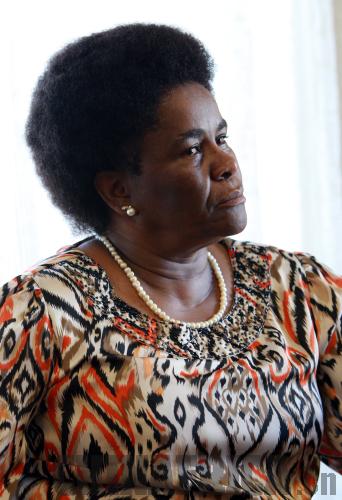|
 |
|
Pelonomi Venson-Moitoi, Botswana's Minister of Education and Skills Development (PHOTO BY JIANG XIAOYING) |
This year marks the 36th anniversary of the establishment of China-Botswana diplomatic ties. Invited by China's Ministry of Education, a Botswana high-level educational delegation headed by Pelonomi Venson-Moitoi, Botswana's Minister of Education and Skills Development, paid a one-week visit to China in April 2011. During the visit, the minister sat down with ChinAfrica reporter Liu Jian and shared her views on Sino-Botswanan educational exchanges and cooperation.
Could you briefly introduce the educational cooperation between the two sides?
The Chinese Government has constructed two primary schools in 2010 in Botswana at a total cost of 20 million pula ($3.08 million). Construction of another school will commence this year. There is also cooperation in the area of technical education between a college in Botswana (Francistown Technical College) and Tianjin University of Technology and Education. Collaboration also exists between the University of Botswana (UB) and Shanghai Normal University, which has led to the establishment of a Confucius Institute at UB. Furthermore, the Chinese Government has to date, offered scholarships to more than 70 Botswanan students.
How is your ministry planning on achieving "an educated and informed nation" by 2016?
The Ministry of Education supports the Vision 2016 in terms of creating "an educated and informed nation" and "a prosperous, productive and innovative nation." Lately we've developed a human resource strategy, which is trying to bring an integrated approach to the human resource development. It's based on the strategy that we are trying to make sure that our planning of human resource starts from early childhood all the way up to the university level. The critical issues there are life-long learning, high levels of education to [meet] the needs of our economy, the whole issue of access and equity.
In what way does China-Botswana educational exchanges and cooperation help achieve this goal?
The above areas of cooperation go along in facilitating and driving the pillar of "an educated and informed nation," as they have helped to increase the number of Botswanans with access to education. With China being a leading country in the use of information technology, Botswana is, through the existing cooperation, afforded opportunities to acquire and use the best available information technology.
What role can Botswanan students play at home after returning from scholarships study in China?
After graduating, recipients of the Chinese Government scholarships take home knowledge of the Chinese language, social and business culture. With the increasing rate of cooperation between the two governments these graduates can be utilized to facilitate communication to ensure mutual understanding of expectations. The graduates can also play an active role in promoting investment between Chinese and Botswanan investors.
What is being done to help Botswanan graduates find jobs?
Botswanan graduates like any other global citizens are faced with challenges of being absorbed by the labor market or economy upon returning home. However, the Botswanan Government is now placing emphasis on Botswanans creating jobs for themselves and other Botswanans. Empowerment programs that provide financial assistance and mentoring have thus been put in place to inculcate a culture of entrepreneurship.
In terms of educational opportunities, how is the gender equality realized in Botswana?
The female literacy rate is actually higher than that of men. The performance of the female students in our schools surpasses that of boys, which is clearly indicated by our latest results. We have no discrimination and there is a gender balance. In some countries students are channeled by gender, but with us, female students can choose to do once male-dominated subjects. So there is no barrier. A female student can do any subject as long as she has passion and competence to do it.
What are your expectations on future prospects for cooperation?
The youth as future leaders are strategically positioned to determine the future of the two countries. Our expectations are that future prospects for cooperation will be in the following areas: exchange of education material /equipment to assist in the establishment of pre-school level in Botswana. We hope to benefit from the expertise and experience in China as it has one of the best pre-school systems in the world; introduction of science related subjects at early childhood learning; and exchange of trainers. |